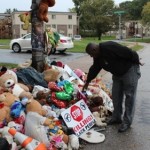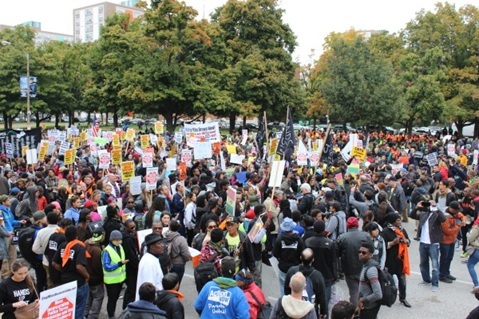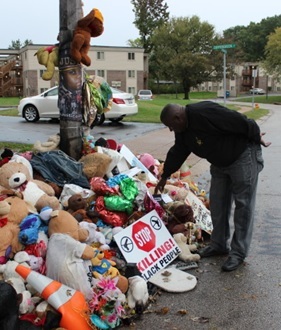
In the weeks following the death of Ferguson, Missouri teenager Mike Brown on August 9, 2014, thousands flocked to the city to protest the killing and stand in solidarity with Brown’s family and community. Members of the clergy, local and national youth-led organizations like the Dream Defenders, celebrities, and even Tibetan monks joined to mourn the death of another unarmed Black teen — and to stand in solidarity against the violence and racism that Black communities face on a daily basis. And while dozens of progressive organizations were there to support the people of Ferguson from day one, activists and community members started to ask a very important question. “Where are the labor unions?” As a labor leader myself — and as a Black man who has faced…
In the weeks following the death of Ferguson, Missouri teenager Mike Brown on August 9, 2014, thousands flocked to the city to protest the killing and stand in solidarity with Brown’s family and community. Members of the clergy, local and national youth-led organizations like the Dream Defenders, celebrities, and even Tibetan monks joined to mourn the death of another unarmed Black teen — and to stand in solidarity against the violence and racism that Black communities face on a daily basis.
And while dozens of progressive organizations were there to support the people of Ferguson from day one, activists and community members started to ask a very important question.
“Where are the labor unions?”
As a labor leader myself — and as a Black man who has faced police violence in my own life — I know that they were not wrong to ask that question.
For so long in the labor movement we have called for others to join us as we champion worker’s rights and fight for a better future for working families. We have implored our communities to fight with us to create a stronger and thriving middle class, but we have fallen silent on issues of racial justice when our brothers and sisters needed us to speak up most.
I remember the day a police officer threatened my life like it was yesterday. I was sixteen, standing outside a burger joint in San Dimas, California early in the morning. I was waiting for the restaurant to open so that I could inquire with the manager about a job opening.
But none of this mattered to the police officer who stopped me.
He told me that I matched the description of someone who had committed a crime, pulled out a shotgun, and pointed it at my head. He had me get in the back of his car and ominously warned that if I tried to jump out of the car, he would blow my brains out. I have never been so afraid in my life.
When I was older, a different officer pulled me over and challenged me to a fist fight after I asserted there were no open containers of alcohol in the vehicle. This is just one of the many times I have been pulled over — an all too familiar experience for Black men — and that same officer pulled over me, my father, and each of my three brothers on at least five separate occasions.
Unjust encounters with police are an everyday occurrence for Black and Brown youth and adults throughout the country. So when community activists in Ferguson put a call out for labor leaders and others to join them during the National Weekend of Resistance in October, I answered the call without hesitation.
What I experienced in my short time in Ferguson was incredible. In the midst of great pain, a ground swell of young activists had channeled their hurt and anger and are turning this moment into a movement. Marching with thousands of people to stand up against racism and oppression, I couldn’t help but be reminded of civil rights movement.

Then I started to think about why it was so important that labor union be present in Ferguson. In 1968 the labor movement joined forces with the civil rights movement in Memphis for a strike of the sanitation workers there. One-thousand-and-three-hundred Black men, citing years of poor working conditions, discrimination, and on-the-job deaths, joined forces with the American Federation of State, County, and Municipal Employees (AFSCME) to fight for justice. Labor and civil rights worked together to bolster the efforts of the sanitation workers and, after two long months of striking and facing police violence, we won. Lives were lost in that fight — Martin Luther King, Jr. was assassinated in Memphis during his time with the strikers — but justice prevailed.
This is precisely the kind of solidarity that we need in Ferguson now. It’s the kind of solidarity we need across this country.
We all need to get involved, and labor in particular needs to be on the ground in Ferguson. Not as leaders of the cause or as representational figureheads, but as active participants there to listen, learn, and fight. For too long we have tip-toed around the issue of racial justice. Now is the time to change that — because we know that there can be no economic justice without racial justice, and because we know that if we don’t do something, these atrocities will continue to happen, and the lives of our Black youth will continue to be lost.
Since the announcement that Officer Darren Wilson — the man who shot and killed Mike Brown — would not be indicted, multiple protests and boycotts have taken place in Ferguson and throughout the nation. Last week another grand jury announced that they would not indict Officer Daniel Pantaleo, another cop who killed an unarmed Black man. New York resident Eric Garner was put in an illegal chokehold that killed him, a bystander filmed the entire scene, the medical examiner ruled Garner’s death a homicide, and justice still was not served. These appalling events have left many of us wondering if our lives have any value.
Activists are calling for the world to recognize that Black lives matter. For those of you watching as these events unfold from the comfort of your homes, particularly those of you in the labor movement, I implore you to find your way to Ferguson and join me as I head back. History has always shown that we are stronger together. In this moment we must decide whether we’ll watch from a distance and make an official statement, or get on the ground and get to work. None of us can afford to sit this one out.
See the article here –





















